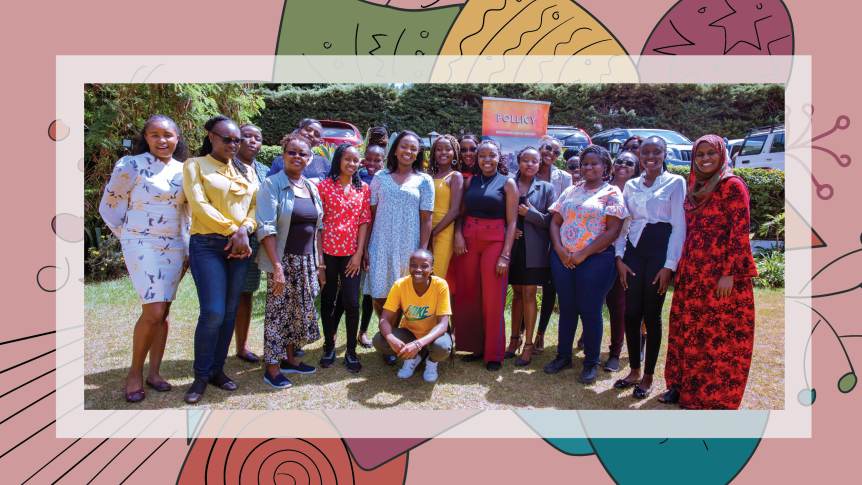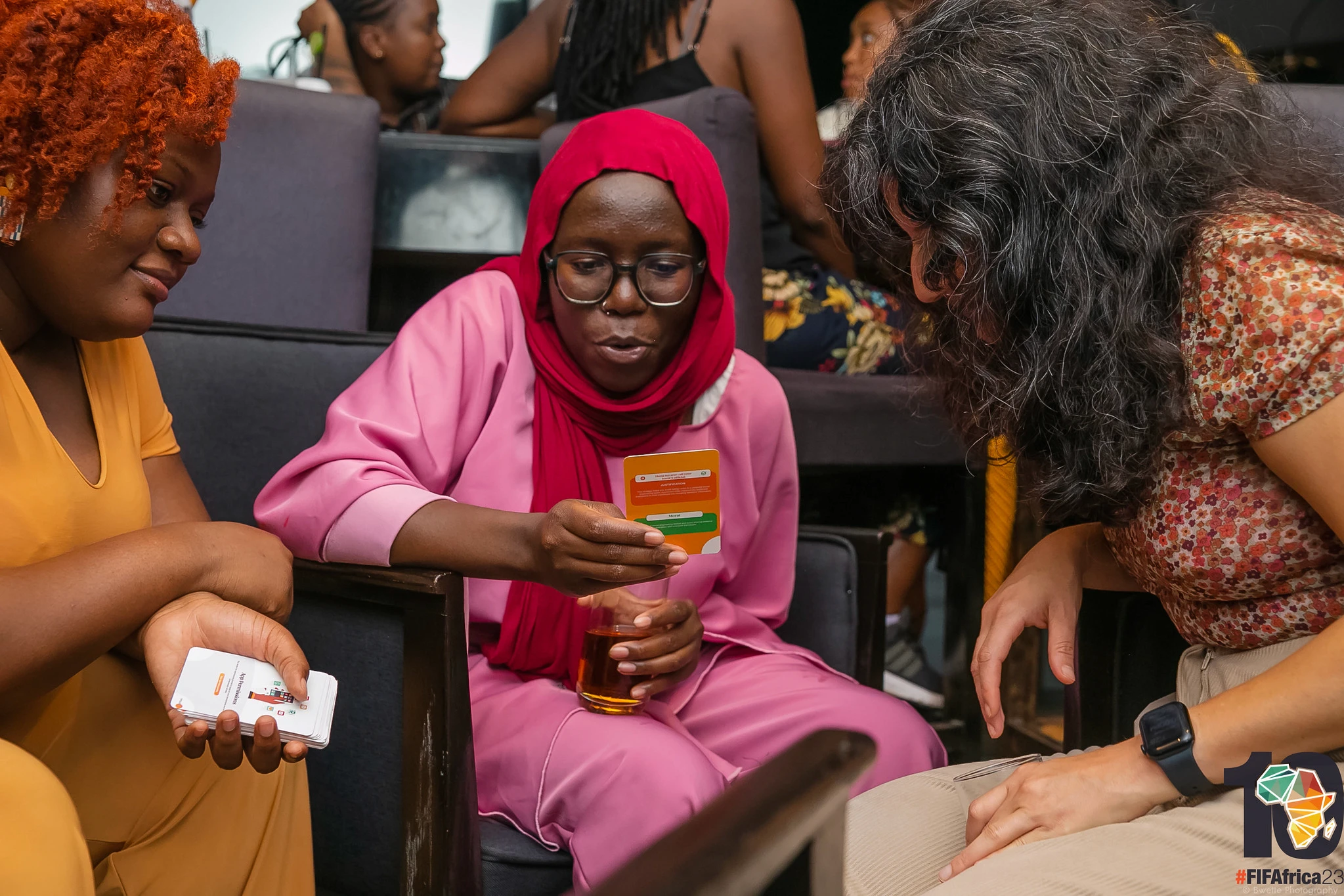
“If people react to what I say online, I should step back and analyse the situation. One should not be scared. Being cautious, being aware of reactions to what you say, also builds resilience. It is learnt from how you respond to abuse online.”
Raylenne Kambua, a journalist and communications officer at APC network member International Association of Women in Radio and Television-Kenya (IAWRT-K), worried about digital safety. On 28 February and 1 March 2023, Kambua attended a two-day workshop organised by another APC member, Pollicy. She had signed up because she wanted to learn skills to manage the toxicity of social media. After the workshop, she came away thinking hard about the idea of digital resilience.
This was exactly what Pollicy hoped to do. Kambua was one of about 50 journalists and social communicators from Uganda and Kenya who attended the workshop that arose out of Pollicy’s project, “The Future of Work: Improving Digital Safety for Women at Work and Combating Gendered Disinformation”. The project, supported by an APC subgrant, aims to build a critical mass of African women who are well-versed in digital safety, resilience and shaping a feminist internet. “When women face harassment, they feel forced to leave digital spaces,” said Kambua as she recalled the workshop. “The idea of developing digital resilience was a key takeaway.”
So what does digital resilience look like? Kambua’s response was thoughtful. “As a woman journalist, you say something. Women journalists are considered ‘vocal’. If people react to what I say online, I should step back and analyse the situation – and not react with anger or other emotions. Some of these people are just keyboard warriors. One should not be scared. Being cautious, being aware of reactions to what you say, also builds resilience. It is learnt from how you respond to abuse online. It determines the impact on you for the future. It’s a long process.”
She also spoke about actions she has taken to change online behaviour since the workshop. “Sometimes I am a content consumer and sometimes a producer. We have to be considerate. I shouldn’t bully people online, and then expect people to not be bullied. I have many friends who are Twitter influencers. I told some of them [who bully others online] not to do it. I explained how it creates a cycle and encourages others to harass people online. Some friends listened and some didn’t.” She shrugged. “For some of them all publicity is good, even bad publicity.”
Empowering women journalists in East Africa
Pollicy has collaborated with organisations in Uganda and Kenya such as the IAWRT-K, the Uganda Media Women’s Association (UMWA) and the Association of Media Women in Kenya (AMWIK) to understand how women in media can “survive the realities of the future of work.” We spoke with Pollicy’s programmes coordinator, Rachel Magege, and their engagement and advocacy lead, Tricia Gloria Nabaye, about the project’s journey and next steps.
Kenya recently saw massive protests around gender-based violence. Magege and Nabaye say that what was happening in Kenya was familiar in Uganda – femicides and gender-based violence on women journalists as well as other women. Pollicy was familiar with the issues faced by women in media, such as how many journalists have become freelancers over the last few years. While this gives them independence, it also removes the security of being attached to media houses. The question Pollicy asks is if women journalists in Kenya had safety from gender-based violence even when they were attached to media houses.
For journalists, gendered disinformation campaigns are especially effective when combined with other forms of attacks, such as online abuse and harassment, which aim at silencing their voice in public ~@ggithaiga @KICTANet #IWD23 #FutureOfWork @FNF_EastAfrica @PollicyOrg pic.twitter.com/zMXDgqqDEU
— IAWRT-Kenya (@IawrtK) March 1, 2023
A big focus of Pollicy’s work in this area has been to look for solutions for the problem of where women can report cases of misinformation and digital harassment. “Cybersecurity departments in police stations, the gender desk – we looked into that and tried to see how effective they really were. Not very effective,” said Magege. “The implementation of many cybersecurity laws for the protection of women is still very, very poor. So that would be an interesting angle for the future – to look into more in terms of the legal remedies and spaces where they can report.”
The election processes in countries like Tanzania and Kenya highlight the importance of empowering media professionals to navigate the complexities of reporting and ensuring accountability. Pollicy’s project aims to increase its presence and collaborate with organisations across Africa, aligning with its organisational mission as an African-based institution dedicated to promoting a safer and more inclusive media landscape.
Innovative tools and collaborative relationships
One interesting by-product of the project has been “Where's My Data?”, a card game developed by Pollicy as a creative tool for training sessions on data protection and digital rights. As Neema Iyer, founder and former executive director of Pollicy writes, it has been an organisational tradition to play “Otyo, a Uganda-specific Taboo-like game at all our gatherings and retreats, where things often get heated and hectic.” Iyer and Phillip Ayazika, director of programmes at Pollicy, co-developed the card game. Iyer writes that a player needs to make “headway by successfully navigating through the challenges and making wise choices to protect your data.” Each card offers a familiar data privacy or security scenario – scams, surveillance, hacking, passwords, phishing, etc.

“It's a creative way of helping a person remember, ‘Oh, when this happens, it’s a data breach.' Or, ‘What sites am I using for fact-checking? Did I just use fake news?’ Easier than me coming with slides for training,” laughs Nabaye. They tested their card game at the Africa Internet Governance Forum and at the Forum of Internet Freedom in Africa in 2023, both forums at which the game was very well received. Pollicy has also designed an online game addressing disinformation called Choose Your Own Fake News, and participants at the two-day workshop also played another game called Digital Safe-Tea.
Magege noted that one of the project’s highlights for her has been the building of collaborative relationships. She spoke of Cecilia Maundu, a broadcast journalist and specialist in gender digital security training in Kenya. “When we interacted with Cecilia, she had just begun to host a podcast called Digital Data Podcast and exploring digital rights training. Today she is a full-fledged trainer. She continues to empower women through digital skills trainings, through digital storytelling and creative writing workshops. In our collaboration with Digital Data and Cecilia Maundu, there is growth and change within the space even in the last few years – such as the existence now of generative AI in newsrooms which is contextually unregulated. We are glad to see the work continue.” Through the project's engagement, Maundu became actively involved in digital rights work and has since become a full-time trainer, conducting workshops on these topics. Magege added, “We're trying to make sure that there is longevity long after the consultations and the trainings, making sure that communities are brought together in what we've termed ‘communities of practice' to continue the work and to build networks.”
The project's impact has also extended beyond just workshops in the form of collaborations with media associations, including through panel discussions, debates, and podcasts, ensuring that the dialogue on misinformation, tech-facilitated gender-based violence and women's issues in media remained ongoing. The project itself continues to grow across the continent. Pollicy has just finished focus group discussions in Uganda, Kenya and Cameroon and is planning discussions for Senegal, the Democratic Republic of Congo and Mozambique. They plan to release an Afro Feminist Internet Scorecard that will inform their interventions in each of these countries. The scorecard, along with Pollicy’s Afro Feminist Internet Awards, will be launched at their Data Fest event in Kenya in mid-July.
As someone who hoped that the Pollicy workshop would give her skills that she could share with colleagues, Raylenne Kambua at IAWRT-K came away hopeful. The workshop encouraged her to take the first step to create a safe environment. “Digital safety starts with you,” concluded Kambua. “If I don’t do it, then my neighbour won’t either.”
Cover image via Raylenne Kambua at International Association of Women in Radio and Television-Kenya (IAWRT-K)